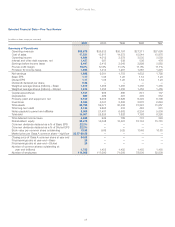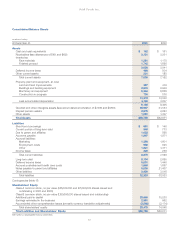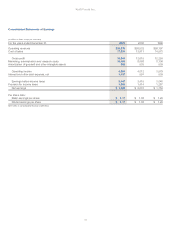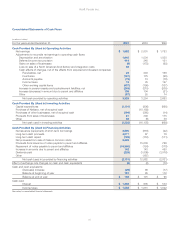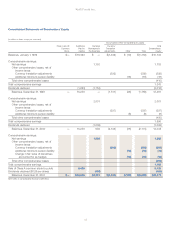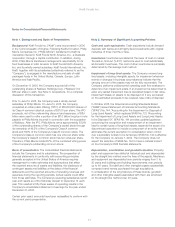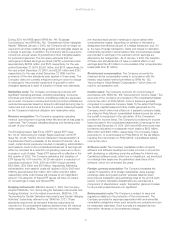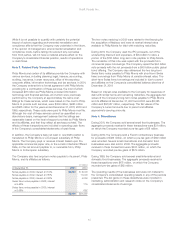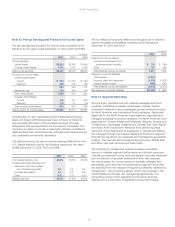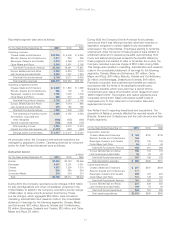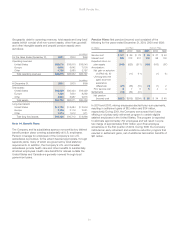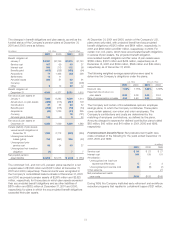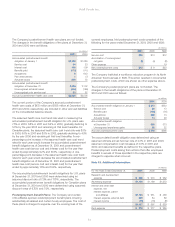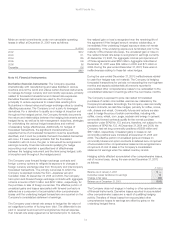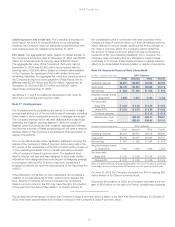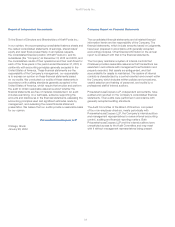Kraft 2001 Annual Report Download - page 54
Download and view the complete annual report
Please find page 54 of the 2001 Kraft annual report below. You can navigate through the pages in the report by either clicking on the pages listed below, or by using the keyword search tool below to find specific information within the annual report.
Kraft Foods Inc.
48
of the grant. Shares available to be granted under the Plan at
December 31, 2001 were 54,688,173.
The Company’s Board of Directors has also adopted the Kraft
Director Plan. Under the Kraft Director Plan, awards are granted
only to members of the Board of Directors who are not full-time
employees of the Company or Philip Morris or their subsidiaries.
Up to 500,000 shares of Class A common stock may be awarded
under the Kraft Director Plan. During 2001, 8,945 stock options were
granted under the Kraft Director Plan. Shares available to be granted
under the Kraft Director Plan at December 31, 2001 were 491,055.
The Company accounts for the plans in accordance with the
intrinsic value-based method permitted by SFAS No. 123,
“Accounting for Stock-Based Compensation,” which does not
result in compensation cost.
Option activity was as follows for the year ended December 31, 2001:
Weighted
Shares Subject Average
to Option Exercise Price
Balance at January 1, 2001
—
$
—
Options granted 21,038,722 31.00
Options canceled (268,420) 31.00
Balance at December 31, 2001 20,770,302 31.00
Prior to the IPO, certain employees of the Company participated
in Philip Morris’ stock compensation plans. Philip Morris does
not currently intend to issue additional Philip Morris stock
compensation to the Company’s employees. Philip Morris accounts
for its plans in accordance with the intrinsic value-based method
permitted by SFAS No. 123, “Accounting for Stock-Based
Compensation,” which does not result in compensation cost.
The Company’s employees held options to purchase the following
number of shares of Philip Morris’ stock: 57,349,595 shares at an
average exercise price of $34.66 per share at December 31, 2001;
56,977,329 shares at an average exercise price of $30.46 per share
at December 31, 2000; and 39,911,082 shares at an average
exercise price of $34.34 per share at December 31, 1999. Of these
amounts, the following were exercisable at each date: 44,930,609
at an average exercise price of $31.95 per share at December 31,
2001; 38,444,963 at an average exercise price of $34.82 per share
at December 31, 2000; and 31,071,681 at an average exercise price
of $32.75 per share at December 31, 1999.
Had compensation cost for stock option awards under the Kraft
plans and Philip Morris’ plans been determined by using the fair
value at the grant date, the Company’s net earnings and EPS
(basic and diluted) would have been $1,785 million and $1.11 for
the year ended December 31, 2001; $1,947 million and $1.34 for
the year ended December 31, 2000; and $1,713 million and $1.18
for the year ended December 31, 1999. The foregoing impact of
compensation cost was determined using a modified Black-
Scholes methodology and the following assumptions:
Weighted
Risk-Free Average Expected Fair Value
Interest Expected Expected Dividend at Grant
Rate Life Volatility Yield Date
2001 Kraft 4.81% 5 years 29.70% 1.68% $ 9.13
2001 Philip Morris 4.86 5 33.88 4.78 10.36
2000 Philip Morris 6.58 5 31.71 9.00 3.19
1999 Philip Morris 5.81 5 26.06 4.41 8.21
In addition, certain of the Company’s employees held shares of
Philip Morris restricted stock and rights to receive shares of stock,
giving these employees in most instances all of the rights of
shareholders, except that they may not sell, assign, pledge or
otherwise encumber such shares and rights. Such shares are
subject to forfeiture if certain employment conditions are not met.
During 2001 and 2000, Philip Morris granted to certain of the
Company’s U.S. employees restricted stock of 279,120 shares and
2,113,570 shares, respectively. Philip Morris also issued to certain of
the Company’s non-U.S. employees rights to receive 31,310 and
683,790 equivalent shares during 2001 and 2000, respectively.
During 1999, there were no restricted stock grants issued to the
Company’s employees. At December 31, 2001, restrictions on the
stock, net of forfeitures, lapse as follows: 2002—2,638,410 shares;
and 2003—92,000 shares. The fair value of the restricted shares
and rights at the date of grant is amortized to expense ratably over
the restriction period through a charge from Philip Morris. In 2001,
2000 and 1999, the Company recorded compensation expense
related to restricted stock awards of $39 million, $23 million and
$3 million, respectively.
Note 11. Earnings Per Share:
Basic and diluted EPS were calculated using the following for the
years ended December 31, 2001, 2000 and 1999:
(in millions)
2001 2000 1999
Net earnings $1,882 $2,001 $1,753
Weighted average shares for
basic and diluted EPS 1,610 1,455 1,455
During June 2001, the Company completed an IPO of 280,000,000
shares of its Class A common stock. Immediately following the
IPO, the Company had 1,735,000,000 Class A and B common
shares outstanding.


